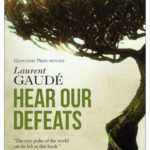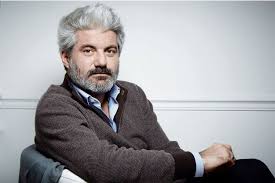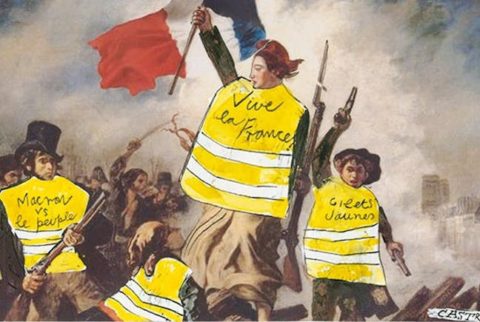
In Laurent Gaudé’s novel Hear Our Defeats, war is and always has been constant. In the story’s foreground, Gaudé conscripts three characters into the turmoil of the Middle East in 2015. There is Assem Graieb, a French national born in Iraq, an intel operative who drops into hot zones, arranges coups and killings, such as the demise of Khaddafi. There is Sullivan Sicoh, an American Special Forces fighter, a member of the team that swooped in to kill Bin Laden, but who now is operating in south Beirut as a drug trafficker – or maybe a revolutionary or drug dealer. Finally, there is Mariam, a Paris-based Iraqi archaeologist obsessed with the recovery of her country’s looted artifacts. Assem and Mariam spend a single night together at the outset.
Assem is dispatched by French intelligence to determine if Sicoh, a modern day Mr. Kurtz, is a security threat, crazy, or both. Mariam heads to Erbil to salvage antiquities. In alternating brisk segments, Assem and Mariam speak in their own voices. An unnamed narrator also speaks about them – and serves up segments that follow Hannibal’s victory at Cannae and defeat near Zama, Ulysses Grant’s pitiless campaign through the south, and Haile Selassie’s defenseless collapse before Mussolini. The slaughters occur in these historical interludes, while shallow-breathed pauses and sinister shadows stain the contemporary through-line.
Through a subject+predicate sentence drumbeat, Gaudé draws us into the seductive aura of intrigue. He depends on our inclination to admire fidelity to ideals dissociated from the virtues of our peaceful lives. Will Assem survive his mission and have to kill Sicoh? In light of her country’s lawlessness, does Mariam have even the slimmest chance to save the remnants of ancient civilization? Will U. S. Grant be sober when he meets Lee at Appomattox, or is he irremediably hurt by all he has witnessed? Gaudé ‘s language suggests candor about actuality – but a murmur seems to arise from beneath the facts of the present. What is it saying? Having mustered us to charge into the smoke and fire, is Gaudé asking us to be complicit with his main characters?
It may suddenly occur to the anglophone reader that this is also a novel with a finger on the pulse of France – fittingly represented by Assam Graieb, a Muslim. There are now more practicing Muslims in France than practicing Catholics. Iraq and Syria are two former French fiefdoms, and the turmoil in the Middle East is testing the power of the west’s post-World War II National Security State. The gilets jaunes protesters in France are rebelling against an elite class that enjoys the profits of a technology-driven global economy policed by a military/intelligence superstructure. Gaudé updates the terms of France’s querulousness over Déclinisme in the new millennium: La Patrie is regressing but its immigrants are committed to helping her strive on.
The unnamed narrator speaks about Mariam:
 “Her country is going to pieces: invaded from the north, and ravaged by chaos in the south. She is in a city, Erbil, that does not want to be Iraqi anymore. Iraq will soon be another Yugoslavia: a vanishing country. And she, the woman from Baghdad, will have to find another nationality. Her country is being torn apart like a rag pulled at from all four corners. But did this country ever really exist? The one that was thought up and outlined and drawn by Churchill, Lawrence, and Gertrude Bell? Has it every been anything but the dream of a country, imposed by authority in a region rife with other tensions, other movements? She is in Mesopotamia. Which did exist. And perhaps that is why she wants so urgently to visit the citadel of Erbil tonight.”
“Her country is going to pieces: invaded from the north, and ravaged by chaos in the south. She is in a city, Erbil, that does not want to be Iraqi anymore. Iraq will soon be another Yugoslavia: a vanishing country. And she, the woman from Baghdad, will have to find another nationality. Her country is being torn apart like a rag pulled at from all four corners. But did this country ever really exist? The one that was thought up and outlined and drawn by Churchill, Lawrence, and Gertrude Bell? Has it every been anything but the dream of a country, imposed by authority in a region rife with other tensions, other movements? She is in Mesopotamia. Which did exist. And perhaps that is why she wants so urgently to visit the citadel of Erbil tonight.”
Hear Our Defeats smells of blood and gunpowder – yet (or therefore) we follow Gaudé and his characters into their respective hells. He is a shrewd novelist: his prose pleases through élan and a persuasive affinity for its subject – but something else is bleeding out. Strangely, Sullivan Sicoh begins to represent a sort of semi-deranged alternative or third party. After nearly losing his life on mission during which he called in a missile strike, he is rescued by fellow American forces – and in two hours, he is flown from Iraq to Vienna: “To move from one world to another is the hardest thing. And perhaps that is what finished Job off.” It occurred to me that Gaudé’s intention may be to give his reader, buffeted by current affairs and the annals of war, a taste of literary PTSD as well.
 A totem for the capacities of love, Mariam returns to Paris. In the hotel bar, she meets a man who confesses his failures to her. From this scene, Gaudé establishes the overt presence of failure in the arc of every life — not defeat, but failure, a condition, an inadequacy of inner and physical resources to wield against real adversaries. Hear Our Defeats emits more than a whiff of 1950’s existentialism, as if the Ministry of Defense is still smarting from Dien Bien Phu, and perhaps it is. Can one accept the deaths of thousands only by adhering to Sartre’s “bad faith”? “But one day there is a moment of capitulation,” says the third-person voice, “and leading up to this, progressively, is the tipping into loss, that second period of life when strength is diminished, where sudden burst of enthusiasm and astonishment and surprise grow rarer …. A period of defeat that is nevertheless part of all the rest.”
A totem for the capacities of love, Mariam returns to Paris. In the hotel bar, she meets a man who confesses his failures to her. From this scene, Gaudé establishes the overt presence of failure in the arc of every life — not defeat, but failure, a condition, an inadequacy of inner and physical resources to wield against real adversaries. Hear Our Defeats emits more than a whiff of 1950’s existentialism, as if the Ministry of Defense is still smarting from Dien Bien Phu, and perhaps it is. Can one accept the deaths of thousands only by adhering to Sartre’s “bad faith”? “But one day there is a moment of capitulation,” says the third-person voice, “and leading up to this, progressively, is the tipping into loss, that second period of life when strength is diminished, where sudden burst of enthusiasm and astonishment and surprise grow rarer …. A period of defeat that is nevertheless part of all the rest.”
In the end, Gaudé rigs up an equivalence between history’s battles and the trials of individual life. Exhaustion and sickness. Hear Our Defeats, one finally sees, has blatantly displayed its melancholic intentions all along. Gaudé, like Mathias Énard, is a previous Goncourt Prix winner – and like the latter’s Compass, Hear Our Defeats deals with the Middle East, orientalism, archaeology, travel, love, and history. But for Énard, language – how we conceive of history and ourselves through narrative – is foregrounded. Gaudé’s novel is slicker, less ambitious, and sets a trap for its audience by exploiting its most accessible fears and taste for packaged history.
 Yet in its way, Hear Our Defeats is also about language — in that all the characters and anonymous narrator sound alike — driven, anxious, overwhelmed, obdurate. The prose doesn’t vary; voices differ only in the materials they address. Gaudé has worked to craft the sound of his moment, even if it borrows generously from a decades-long fretfulness. His novel wages a brilliant campaign of words. But against what? Sullivan Sicoh, who has seen it all, seems to have the last word: “The battles we were asked to win – we’ve won them, but you and I both know that we have been defeated, we can feel it inside, something has gone too far, or has lost its meaning … Don’t you think so, lieutenant?”
Yet in its way, Hear Our Defeats is also about language — in that all the characters and anonymous narrator sound alike — driven, anxious, overwhelmed, obdurate. The prose doesn’t vary; voices differ only in the materials they address. Gaudé has worked to craft the sound of his moment, even if it borrows generously from a decades-long fretfulness. His novel wages a brilliant campaign of words. But against what? Sullivan Sicoh, who has seen it all, seems to have the last word: “The battles we were asked to win – we’ve won them, but you and I both know that we have been defeated, we can feel it inside, something has gone too far, or has lost its meaning … Don’t you think so, lieutenant?”
[Published January 22, 2019 by Europa Editions. 224 pages, $17.00 paperback]